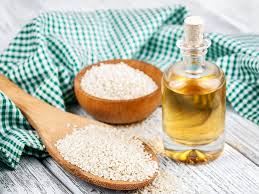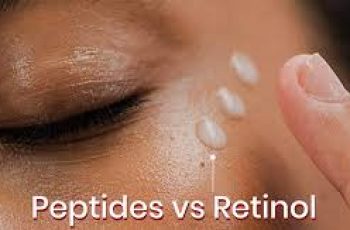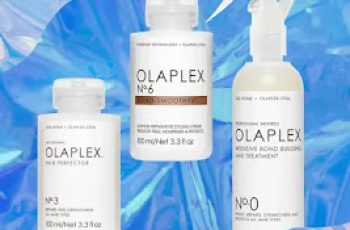Sesame Oil in Skin Care
Sesame oil (Sesamum indicum) is a moisturizing, antioxidant rich oil found in many skin care products that has been used across the world for hundreds of years in food and medicine.
In skin care, sesame oil is sought after for its unique compounds like sesamol, an anti-inflammatory antioxidant, compound unique to sesame plants.
Sesame oil is also notable for its ability to absorb UV radiation, protecting the skin from sun damage when used in sunscreens.
Find out if sesame oil is right for your skin care routine!
What is sesame oil?
Sesame oil is primarily composed of unsaturated fatty acids, meaning it could be classified as a “dry oil.”
Though sesame oil is derived from plants, it is not considered an essential oil because its texture is too thick. Plant oils with high viscosity are often considered carrier oils.
Sesame oil is an unsaturated plant oil with hydrating, antioxidant, antimicrobial, and sun protective properties.
What are the active compounds?
Sesame oil contains many beneficial components like hydrating fatty acids and antioxidant natural compounds.
The four major fatty acids in sesame oil (in order of concentration) are:
Linoleic acid
Oleic acid
Palmitic acid
Stearic acid
The compound that sesame seed oil is most coveted for in skin care, however, is the lignan “sesamol,” not found in other plant species.
Sesamol is a very beneficial compound in skin care which has been lauded for its antioxidant and radiation absorbing properties since the 90’s.(2,3)
Some evidence even suggests sesamol may treat certain types of cancers. (4) That being said, more data is always required on proposed cancer treatments, and drinking sesame oil will not cure cancer.
Other lignans in sesame oil are sesamolin and sesamin. (11)
Sesame oil is also rich in tocopherols, the family of compounds which includes vitamin E.
Studies have also found that these and other active compounds such as various flavonoids and phenolic compounds give sesame oil antimicrobial properties. (12)
Benefits of sesame oil
Skin benefits
Sesame oil is rich in compounds that give it moisturizing, UV protecting, antioxidizing, and antimicrobial properties.
Studies have found it can treat bacterial and fungal conditions like staph infections. It has been used in places like Nigeria for centuries for antibacterial reasons. (5)
Antioxidant compounds present in sesame oil eliminate free radicals on the skin which contribute to wrinkles and aging skin. (3)
The hydrating fatty acids in sesame oil make it a good ingredient in many facial moisturizers.
It is also occlusive, meaning it helps other ingredients and moisture stay on the skin.
Oleic acid, also common in sesame oil, is useful when layering skin care ingredients because it helps other ingredients absorb into the skin.
Side effects
Sesame oil contains comedogenic Palmitic fatty acids, meaning it can clog the pores of your face or hairline if you are prone to acne.
Oleic acid, which sesame oil contains a lot of, can irritate extremely dry skin types, causing inflammation in some cases.
Is sesame oil safe in skin care?
Is it safe?
Sesame oil is safe to use in skin care.
EWG rating of “1,” meaning there are no common health concerns associated with sesame oil.
If you are allergy to sesame seeds in your food, you are likely also allergic to them as a skin care ingredient.
It is a clean, non-toxic ingredient, safe during pregnancy and on baby skin.
The primary danger of sesame oil is using it for incorrectly in your custom skin care regimen or if it’s not right for your Baumann Skin Type.
Take our skin type questionnaire to shop by your skin type!
Take the Quiz
Specific uses
Because sesame oil contains such a broad array of beneficial compounds, it is used in many types of skin care products like moisturizers, sunscreens, skin lightening products, and masks.
It is also used in formulations specifically designed to treat conditions like kinds of hyperpigmentation, dry skin, wrinkles, and hair follicle damage.
Studies have found that sesame oil, (specifically its active compound sesamol) is good at preventing photodamage from damaging UV radiation. (7)
Acne
Despite the seemingly boundless benefits of sesame oil, it is unfortunately not a great choice for acne treatments.
Sesame oil is comedogenic, in part due to palmitic acid, which means it can clog the pores of acne prone skin.
That being said, it does also contain antimicrobial properties which are often good for acne treatments.
If it was not comedogenic, it would be good for acne.
If you are acne prone but would like to include oils in your skin care regimen, here are six non-comedogenic oils to consider:
Avocado oil
Borage seed oil
Grapeseed oil
Mineral oils
Rose oil
Shea Butter
Dark spots
This oil has lots of oleic and linoleic acid, meaning it is a weak tyrosinase inhibitor and can prevent/treat dark spots.
Just like other natural plant-based tyrosinase inhibitors, they are only really effective when used alongside other skin lightening ingredients like PAR-2 blockers or other tyrosinase inhibitors like:
Arbutin
Hexylresorcinol
Licorice extract
Niacinamide
Retinol
Rose oil
There are many ways to treat hyperpigmentation, and many related products contain natural skin lightening oils.
Sesame oil for dry skin
Sesame oil for dry skin
Sesame oil contains tons of linoleic fatty acids and some hydrating saturated fatty acids like stearic and palmitic acid.
Linoleic fatty acids are soothing, anti-inflammatory, and great in barrier repair moisturizers.
Because it also contains a high concentration of oleic acid, it can be irritating to extremely dry skin types or skin conditions like eczema or psoriasis.
Stearic and palmitic acids are also both extremely hydrating and great in many moisturizers.
Hair care
Sesame oil is rich in hydrating fatty acids as well as the valuable compound sesamol, which is a potent anti-inflammatory and antioxidant ingredient.
Sesame oil can be great for repairing damaged follicles or protecting hair from sun damage.
Moisturizing hair follicles is an important part of healthy hair growth if you have a dry scalp.
If your skin is susceptible to acne, be cautious to avoid getting sesame oil on your hair line; it can result in acne on the forehead.
Five other great hair oils are:
Avocado oil
Almond oil
Argan oil
Jojoba oil
Tea tree oil
UV protection
Sesame oil has demonstrated remarkable UV protective qualities in studies.(1)
Sesame oil is a good ingredient for sunscreens because it directly protects the skin from sun damage by absorbing UV radiation.
Because it is such a safe, sustainable, and affordable ingredient, it can be found in many sunscreens or SPF skin products.
Which products contain sesame seed oil?
Here is our complete collection of skin care products with sesame oil! Be sure to take the Baumann Skin Type quiz to make sure sesame oil is right for your skin!
DQH Knowledge drop: In your 20s, your skin cell turnover decreases. (Cell turnover is a key component in keeping your skin youthful.) You know what else slows down? Your collagen production. Starting in your 20s, collagen decreases by about 1 percent per year. Should you want to prevent fine lines and wrinkles, start by eliminating behaviors that contribute to premature aging. “If it’s bad for you, it’s bad for your skin,” says dermatologist Michel Somenek.
“Cigarette smoking reduces blood flow to the skin and causes premature wrinkling and a dull skin texture. Making the repeated pursed motion to inhale can also cause smoker’s lines. Alcohol and recreational drugs are toxins for the skin that damage its cellular structure and DNA,” Somenek tells us. “The faster you eliminate vices while you are young, the better chance your skin and body have to recuperate.” Also, adopting an anti-aging routine in your 20s is key. After all, the best offense is a good defense. We spoke to Somenek and experts Joshua Ross and Audrey Kunin to find out more.
Keep reading for the best anti-aging products for your 20s, according to skincare professionals.
Sunscreen
“We all know that the sun is the number one cause of skin aging and starting the prevention in your 20s is very important,” Ross says. “The majority of your sun damage won’t start to appear until you’re in your 30s, so don’t wait until you see it surface or you’ll be behind the curve. Stay ahead of it with a good-quality zinc-based sunscreen worn daily.”
Farmacy Green Defense Daily Mineral Sunscreen
An invisible sunscreen with SPF 30, plus botanical extracts meant to protect skin with tons of antioxidants. Bonus: It’s clean and fine to use under makeup.
Bareminerals Complexion Rescue™ Tinted Moisturizer Broad Spectrum SPF 30
Although we recommend you use your SPF and moisturizer separately, we also understand moments when you don’t have time or energy for that extra step. For those times, this bareMinerals moisturizer is a great thing to have on hand.
Vitamin C Serum
“A great introduction to anti-aging is to start with a vitamin C serum in your morning skincare routine,” Ross says. “It’s a powerful antioxidant that will neutralize free radicals and brighten the skin.” He adds that it’s a great way to counteract the effects of the sun’s harmful rays, which, as previously mentioned, are among the biggest causes of premature aging.
Drunk Elephant C-Firma™ Vitamin C Day Serum
The Drunk Elephant C-Firma is a lightweight serum that promises to give skin a glow by combining the brightening powers of vitamin C with ferulic acid, l-ascorbic acid, and vitamin E. The included sodium hyaluronate is meant to replace hydration loss, so you shouldn’t have to deal with any irritation.
Sunday Riley C.E.O. Rapid Flash Brightening Serum
This potent serum is jam-packed with vitamin C (15 percent, to be exact), which means it’s a potential superstar at both brightening skin and dousing it in antioxidants.
Peptides
Using peptides on your skin has many benefits, says Somenek. “The skin barrier is what defends the body against pollution, UV rays, bacteria, and toxins. It can be damaged by several everyday factors. Using topical peptides aids in building a stronger barrier,” he says. “Peptides comprise elastic fibers, which are a type of protein. These fibers help to make skin appear taut and firm. Peptides can also help repair damaged skin, relieve inflammation, and even out skin tone. Some peptides can kill acne-causing bacteria that is common in 20-somethings.”
Kunin agrees, saying, “Peptides are an excellent entry point for supporting collagen.” She recommends looking for face and eye treatments that contain these collagen-boosting powerhouses.
Charlotte Tilbury Magic Eye Rescue Cream
This Charlotte Tilbury super-emollient eye cream has a base of coconut oil and shea butter (read: it’s incredibly hydrating). Botanicals plus peptides are meant to help reduce dark circles and boost collagen, respectively.
This creamy moisturizer serves up potent collagen-boosting peptides and pycnogenol, and antioxidant-rich vitamin C. “Instead of sitting on top of the skin, peptides penetrate the outer layer so they go deep. The ‘signals’ they send tell the cells to produce elastin and collagen, which are needed for youthful-looking skin,” explains Somenek.
At-Home Peel Pads
Remember that skin cell turnover fiasco we talked about earlier? One way to help support it is by exfoliating. “Exfoliation is important to help keep skin fresh and luminous,” Kunin says. She recommends using at-home peel pads as an easy and effective way to exfoliate.
“The goal in your 20s is to fight the slowing pace of cell turnover. It is wise to use products that gently exfoliate, yet still remove oil and other impurities. Products that have Alpha Hydroxy Acids (AHA) or Beta Hydroxy Acids (BHA) are a good choice.”
According to Somenek, you should only exfoliate two to three times a week. “People of all ages are guilty of over-exfoliating and that can be too much of a good thing,” he says.
Dermadoctor Kakadu C Intensive Vitamin C Peel Pad
A few swipes of this Derma Doctor powerful peel pad promise to leave your skin glowing and smooth, thanks to the seven (yes, seven) types of chemical exfoliants, including AHA and BHA. It also contains vitamin C via Kakadu plum extract for added brightening and antioxidant protection.
KEY INGREDIENTS Kakadu plum extract is sourced from the Kakadu plum, a fruit grown in northern Australia. It contains vitamin C, which restores the skin’s natural barrier, increases collagen production, and soothes irritation.
Dr. Dennis Gross Skincare Alpha Beta® Universal Daily Peel Pads
These are the gold standard of peel pads, with a cult following and over 900 five-star reviews on Sephora. They’re easy to use and contain a blend of anti-aging exfoliating acids.
Emollient Night Cream
“In your 20s, you need to start upping the hydration in your skincare routine. You may have been cautious of over-moisturizing because of acne in your teens, but as you enter your 20s, your skin transitions and becomes drier,” Ross says. “I recommend an emollient night cream added into your evening skincare regimen.”
“Twenty-somethings need to make sure that they are not using creams that will clog their pores and cause excess oil production,” says Somenek. Opt for non-comedogenic products.
Cerave Skin Renewing Night Cream
One great choice is the CeraVe Skin Renewing Night Cream, which is a non-comedogenic night cream that leaves skin soft and glowy. It combines the moisturizing powers of ceramides and hyaluronic acid.
RoC Retinol Correxion Max Hydration Creme
“The best night cream ingredients contain retinol, benzoyl peroxide, and/or salicylic acid or hyaluronic acid. The goal is to moisturize, yet remove excess oil,” says Somenek. This Roc Retinol Correxion cream fits the bill as it contains both hyaluronic acid and retinol so it promises to moisturize while also being non-comedogenic.



